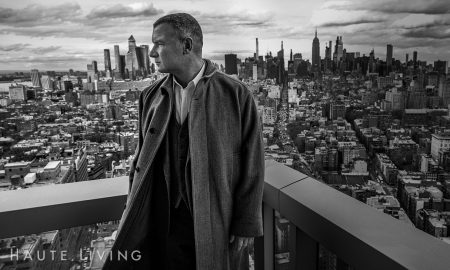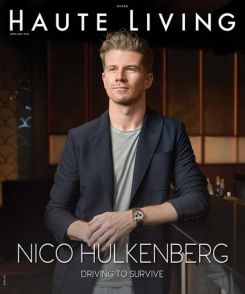Interview by Kamal Hotchandani
Photography by Steven B. Ekerovich
Eric Olson once said, “Music is what life sounds like,” an incredibly apt observation on his part. One man has done more to set the soundtrack of the typical American life over the course of the past four decades than any other: Clive Davis. The unmatched—and unstoppable—mogul is the man behind the music, the one with the golden ears. Since the late 1960s, he has been hand-selecting the greatest musical stars of this era from amidst the millions of aspiring wannabes. He personally launched the careers of megawatt stars like Whitney Houston, Janis Joplin, Alicia Keys, Bruce Springsteen, Aerosmith, Carlos Santana, Chicago, Barry Manilow, and Patti Smith, among others. Being chosen by Clive Davis all but ensures greatness and industry domination, and the albums and singles that result from his choices become the anthems of more than one generation. From his first encounter with Janis Joplin at the Monterey Pop Festival in 1967 straight through to Leona Lewis’ debut album in 2008 and Whitney Houston’s comeback album in 2009, Davis has always had a knack for backing winners.
One has to wonder what the musical landscape of this country would sound like if it weren’t for Davis. This bleak hypothetical was almost a reality. Growing up in humble conditions in Brooklyn, Davis never dreamed of a career in music, however, he did spend a lot of time listening to the pop icons of his day, like Frank Sinatra and Bing Crosby. “That’s what I grew up with,” he explains, “and that’s the music I heard, never remotely thinking that it would become my passion and my life’s calling.” He attended Harvard Law School on a scholarship and was practicing in New York City when fate intervened. His firm repped CBS, and Davis was assigned as General Counsel for CBS subsidiary Columbia Records. The rest, as they say, is history.
He first got a taste of the music industry when he helped to renegotiate a young Bob Dylan’s contract. “You know, that got a lot of press at the time,” he recalls. “I was a very young lawyer in my late 20s, just advising John Hammond, a major figure in music who had signed Bob Dylan. My best recollection, because we are going back many years, is that Dylan was getting some advice that upon reaching the age of 21 he could disaffirm his contract. So the only thing I did was I gave advice to John Hammond. ‘You signed this artist, you have faith in this artist.’ John Hammond was the man who signed Billie Holiday. John Hammond was the man that had signed Aretha Franklin. John Hammond was, subsequently years later, the one who brought Bruce Springsteen for both of us to sign together. So he had a rapport with Dylan. I said, ‘Use your common sense. Speak with him, see what’s on his mind, and allay any questions that he has. If that rapport leads to a mutual trust, just have him come into the office and affirm the contract.’ And that’s what happened.”
While this anecdote certainly showcases Davis’ business acumen, it doesn’t speak to his inherent gift of musical appreciation that has long dictated the popular music platform. He hears what others don’t. While most can appreciate a good tune once it hits the airwaves, being able to recognize potential in an unpolished act is a gift few have, though it took Davis awhile to recognize and utilize this invaluable tool. “Because I was made chief lawyer for Columbia five years out of law school, I never knew what they meant when they said, ‘You have ears,’” he says.
It wasn’t until the Monterey Pop Festival in 1967 that his true talent began to emerge, and subsequently changed the face of popular music. Columbia Records had avoided signing rock bands, but Davis was instrumental in ushering in a new era. “My life-changing moment came when I went to the festival thinking I was just going to enjoy Simon & Garfunkel and the Mamas & the Papas. I didn’t know that they were going to have afternoons showcasing new talent.”





















